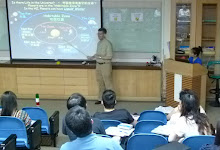Dear Astronomers:
I ask the astronomy community for support for my rockethub
crowdfunding campaign for participation in the AAS conference next
week in Washington, DC to present the evidence for planets migrating
into their stars. Please share my campaign so that I can pay my
registration and not have to stay outside the meeting.
I ask you help me find support due to me having the courage to present an exciting and creative project done all alone with no support, as a means to take back being a full participant in astronomy research by presenting my work showing how planets migrate into the stars.
Please help me get whatever attention possible to seek
philanthropists who support science who could pay my registration and
meals, and pay back for me to not have to use my savings for travel
and a place to stay. A couch in your hotel room, or taking me out for
a meal would be greatly appreciated. I am willing to stand outside
until I get help paying the registration, which scares me since my
talk is Monday morning. Please help me go into the conference, and
please help me to “stop the pile from dwindling.”
Can you share my campaign by forwarding my crowdfunding page on
rockethub to friends? It is at
http://www.rockethub.com/projects/37614-smashing-hot-balls-of-gas-as-planets-crash-into-stars
? Share my blog, too!: astrostuart.blogspot.com. Subscribe to my
videos at http://www.youtube.com/user/astrostuart . I will be
regularly updating and improving both sites, placing new blogs and
videos all while I am also both job searching and preparing my talk.
I seek media coverage of me making a major public effort to stay a
part of the science I chose to do, with the hope of attracting a
documentary filmmaker to document my campaign for participation in
science.
I am campaigning for the civil right of a scientist to maintain his
belonging in those projects he has contributed to with the
expectation of being part presenting the results of the group.
Nothing takes away your sense of belonging more than randomly being
told “no one wants to talk to you,” and I ask the community to
support my refusal to stand for this! I have been campaigning to take
back my participation in the UCSB-affiliated observatory in order to
resume being a part of the transit validation program I started.
Keeping me off makes it look to potential employers as if I didn't
finish when applying for a new job, when the reality is I have been
offered to see the data only after those who came later have a chance
to finish it first, in which case the astronomer who had actually
been at the telescope first becomes required to confirm his results
have been previously presented by those who merely sent in subsequent
online observation requests to the robotic scheduler. Keeping me off
the first papers is how this observatory has kept me unemployed for
years. I have published a request to collaborators to “go around
the observatory” (http://arxiv.org/pdf/1309.3283v1.pdf). I loved
having been this observatory’s first astronomer, and it is a matter
of my civil rights to declare I choose not to leave. The reasons were
random and personal in a way most unwelcome, and my appointment still
had a year remaining, and showed this institution does not support
its members to stay employed by encouraging participation all the way
to finished papers. I ask you help me take back my participation!
I have shown determination and grit to submit papers on projects done
all by myself so to stay a part of discovering the patterns of
exoplanets. It is an ethical matter of the greatest importance that
someone not be forced to leave science in any arbitrary manner as I
have been. Please share this with those who can help me make my $1500
rockethub challenge to go to the AAS meeting as a means to launch
support for me to get my papers through peer review so that I have a
chance at a job.
Help me with whatever resources you can to stand for what is right:
To be allowed and encouraged to participate in science.
Gratefully,
Stuart
S.F. Taylor
Hong Kong and Cottonwood, AZ

